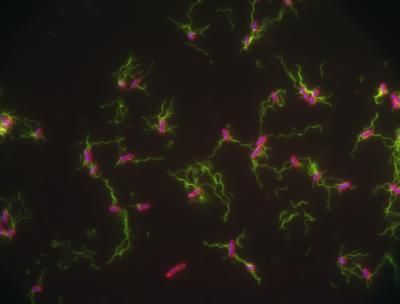Protein that promotes cancer cell growth identified
Caspase-8 plays an important role in proliferation and invasion of cancer cells
Scientists at Burnham Institute for Medical Research (Burnham) have found that the Caspase-8 protein, long known to play a major role in promoting programmed cell death (apoptosis), helps relay signals that can cause cancer cells to proliferate, migrate and invade surrounding tissues. The study was published in the journal Cancer Research on June 15.
The team of scientists, led by Kristiina Vuori, M.D., Ph.D., professor and director of the Cancer Center at Burnham, showed that Caspase-8 caused neuroblastoma cancer cells to proliferate and migrate. For the first time, Caspase-8 was shown to play a key role in relaying the growth signals from epidermal growth factor (EGF) that cause cell division and invasion. The researchers also identified an RXDLL amino acid motif that controls the signaling from the EGF receptor through the protein kinase Src to the master cell proliferation regulator protein, MAPK. This same signaling pathway stimulates neuroblastoma cells to migrate and invade neighboring tissues--a critical process in cancer metastasis.
"Caspase-8 has a well defined role in promoting apoptosis, especially in response to activation of the so-called death receptors on the outside of cells," said Darren Finlay, Ph.D., first author on the paper. "Although Caspase-8 is involved in apoptosis, it is rarely deleted or silenced in tumors, suggesting that it was giving cancer cells a leg up in some other way. Our studies suggest that Caspase-8 does so by activating the MAPK pathway through Src."
Using immuno-blot assays, the scientists showed that EGF signaling was absent in a cancer cell line that is deficient in Caspase-8 and that EGF signaling can be restored by reconstituting the cells with wildtype Caspase-8. Sequence homology studies helped to identify a RXDLL motif in the protein, a sequence that has been shown in other proteins to function in cell signaling. The researchers also used immune-blot assays to demonstrate that reconstituting the Caspase-8 deficient cells with Caspase-8 with mutations in the RXDLL domain did not result in EGF signaling. This suggests that Caspase-8 mediates signaling through the RXDLL domain. The scientists had previously shown in another study that Caspase-8 associates with Src, a protein known to be involved in cancer cell proliferation. In this study they showed that interruption in this association disrupts EGF signaling indicating that Caspase-8 exerts EGF signaling through Src.
Cancer results from excessive cell division and reduced cell death. A number of cell death proteins are missing from human tumors, allowing cancer cells to ignore the cues that keep their growth in check. Cells that can evade apoptosis have a clear growth advantage. Because Caspase-8 is involved in programmed cell death, it would seem that reducing Caspase-8 in cancer cells would provide a growth advantage. However, this is rarely observed in human cancers.
By providing a more complete understanding of the molecular mechanisms involved in cancer cell proliferation and migration, these results point to Caspase-8 as a novel therapeutic intervention point for treating multiple types of human cancers.
Most read news
Other news from the department science

Get the life science industry in your inbox
By submitting this form you agree that LUMITOS AG will send you the newsletter(s) selected above by email. Your data will not be passed on to third parties. Your data will be stored and processed in accordance with our data protection regulations. LUMITOS may contact you by email for the purpose of advertising or market and opinion surveys. You can revoke your consent at any time without giving reasons to LUMITOS AG, Ernst-Augustin-Str. 2, 12489 Berlin, Germany or by e-mail at revoke@lumitos.com with effect for the future. In addition, each email contains a link to unsubscribe from the corresponding newsletter.


















































